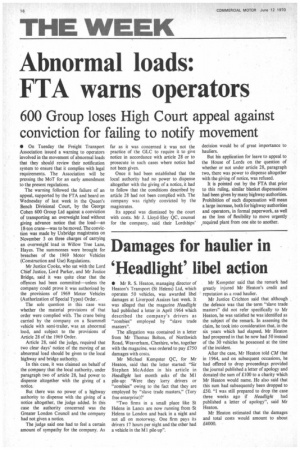Abnormal loads: FTA warns operators
Page 18

If you've noticed an error in this article please click here to report it so we can fix it.
600 Group loses High Court appeal against conviction for failing to notify movement
• On Tuesday the Freight Transport Association issued a warning to operators involved in the movement of abnormal loads that they should review their notification system to ensure that it complies with legal requirements. The Association will be pressing the MoT for an early amendment to the present regulations.
The warning followed the failure of an appeal, supported by the FTA and heard on Wednesday of last week in the Queen's Bench Divisional Court, by the George Cohen 600 Group Ltd against a conviction of transporting an overweight load without giving advance notice that the load—an 18-ton crane—was to be moved. The conviction was made by Uxbridge magistrates on November 3 on three charges of carrying an overweight load in Willow Tree Lane, Hayes. The summonses were brought for breaches of the 1969 Motor Vehicles (Construction and Use) Regulations.
Mr Justice Cooke, who sat with the Lord Chief Justice, Lord Parker, and Mr Justice Bridge, said it was quite clear that the offences had been committed—unless the company could prove it was authorized by the provisions of 1969 Motor Vehicles (Authorization of Special Types) Order.
The sole question in this case was whether the material provisions of that order were complied with. The crane being carried by the company on a Scammen vehicle with semi-trailer, was an abnormal load, and subject to the provisions of Article 28 of the 1969 Order.
Article 28, said the judge, required that two clear days' notice of the moving of an abnormal load should be given to the local highway and bridge authority.
In this case, it was claimed on behalf of the company that the local authority, under paragraph two of article 28, had power to dispense altogether with the giving of a notice.
But there was no power of a highway authority to dispense with the giving of a notice altogether, the judge added. In this case the authority concerned was the Greater London Council and the company had not given a notice.
The judge said one had to feel a certain amount of sympathy for the company. As far as it was concerned it was not the practice of the GLC to require it to give notice in accordance with article 28 or to prosecute in such cases where notice had not been given.
Once it had been established that the local authority had no power to dispense altogether with the giving of a notice, it had to follow that the conditions described by article 28 had not been complied with. The company was rightly convicted by the magistrates.
Its appeal was dismissed by the court with costs. Mr J. Lloyd-Eley QC, counsel for the company, said their Lordships' decision would be of great importance to hauliers.
But his application for leave to appeal to the House of Lords on the question of whether or not under article 28, paragraph two, there was power to dispense altogether with the giving of notice, was refused.
It is pointed out by the FTA that prior to this ruling, similar blanket dispensations had been given by many highway authorities. Prohibition of such dispensation will mean a large increase, both for highway authorities and operators, in formal paperwork, as well as the loss of flexibility to move urgently ,required plant from one site to another.
























































































































